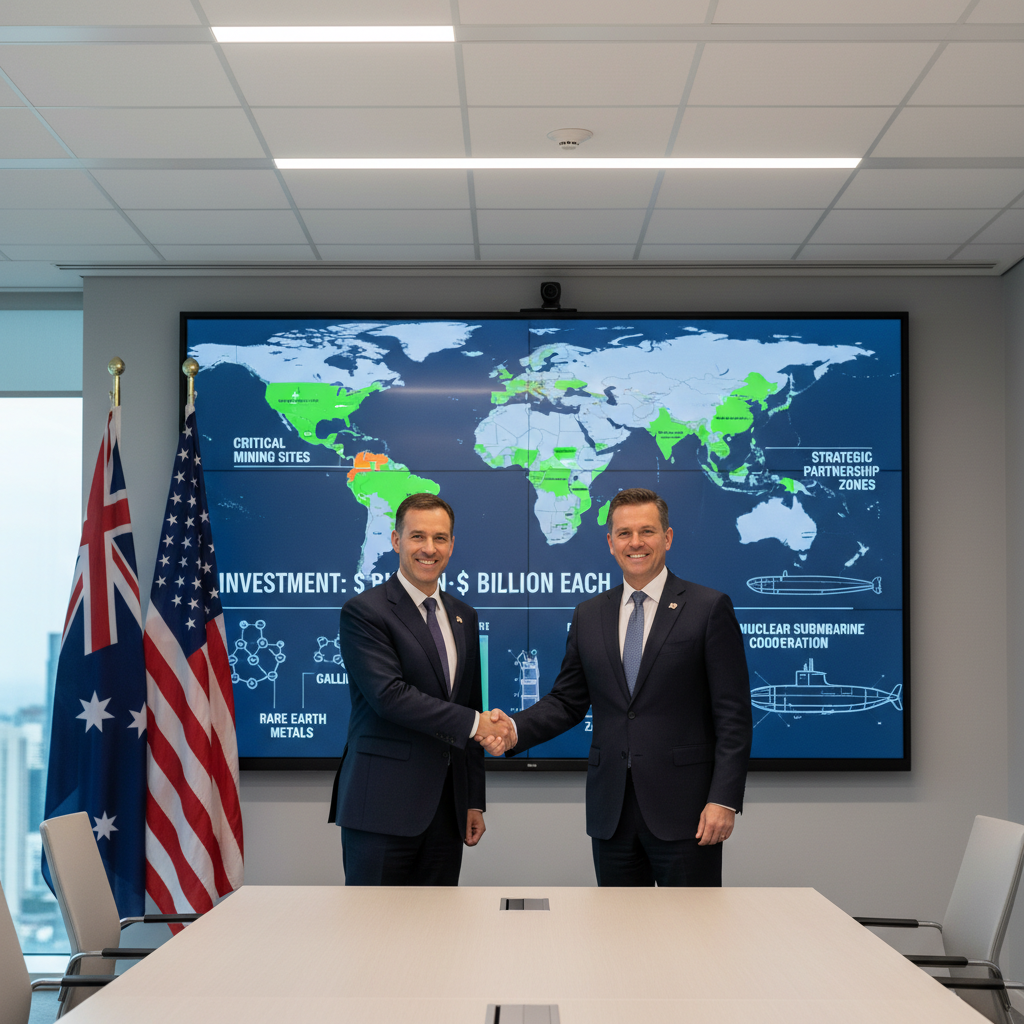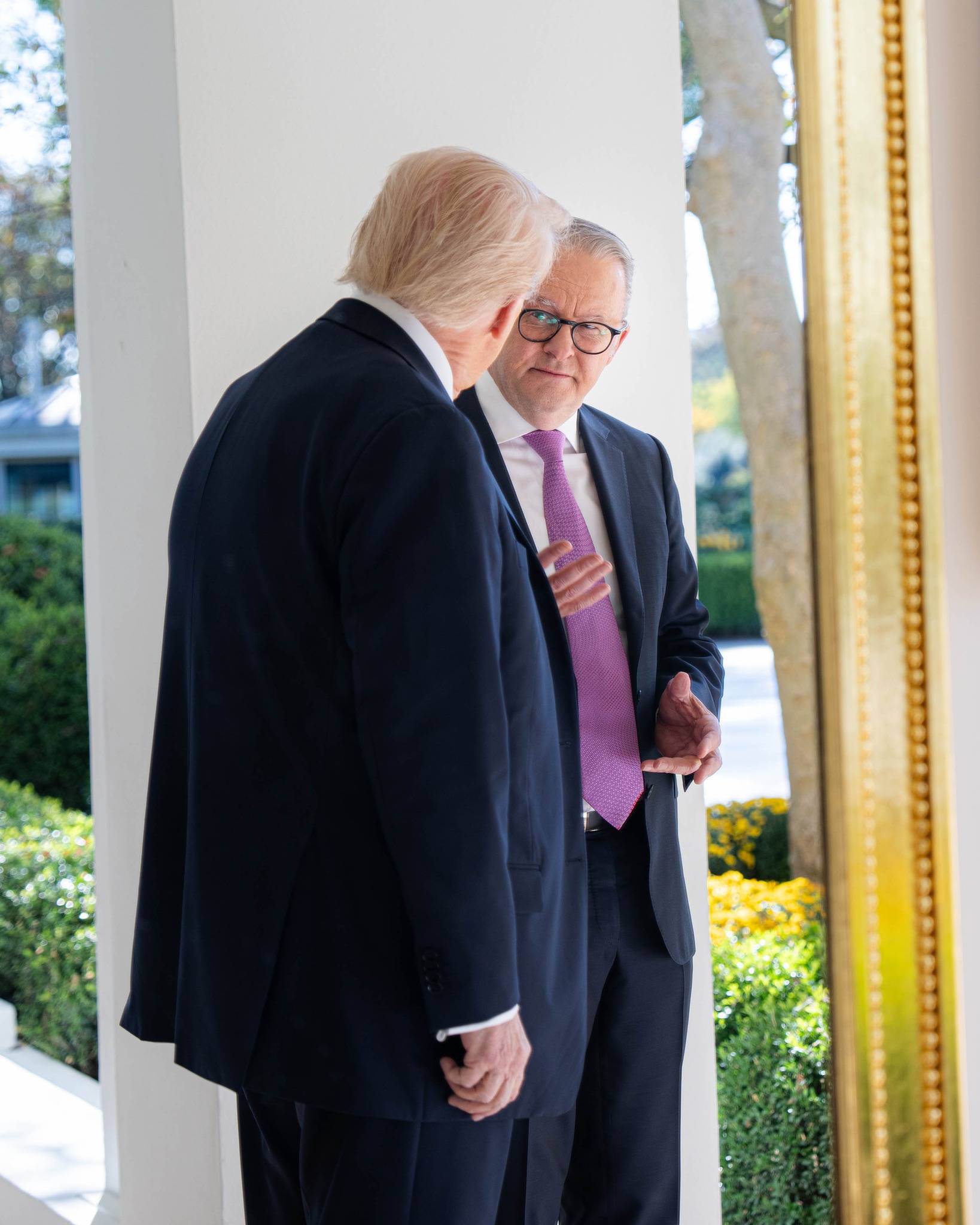
Australia-US Partnership Boosts Critical Minerals and Nuclear Submarines
Australia and the United States have launched a major partnership focused on developing critical minerals, including rare earth metals, and building nuclear-powered submarines under the AUKUS pact. Australia, holding about five percent of global rare earth reserves, and the U.S. will each invest $1 billion over six months to support mining and refining projects, such as a rare earth mine in the Northern Territory and a gallium production project in Western Australia. This collaboration aims to reduce dependence on China, which currently dominates the rare earth supply chain, and to enhance Australia’s naval capabilities with nuclear submarines. The agreement comes amid geopolitical tensions in the Indo-Pacific, reflecting a strategic effort to counter China’s growing influence while balancing complex economic and security considerations.
Summary
Australia and the U.S. Forge Major Agreement on Critical Minerals and Nuclear Submarines
Australia and the United States have announced a significant partnership focused on developing critical minerals, including rare earth metals, and committing to the construction of nuclear-powered submarines. This joint effort aims to counter China’s dominant position in rare earth supplies and strengthen strategic military cooperation under the AUKUS pact.
- Australia holds approximately five percent of the world’s rare earth reserves and produces about eight percent globally.
- Both governments agreed to invest $1 billion each over six months into projects targeting critical minerals.
- Australia will develop a rare earth mine in the Northern Territory and a gallium production project in Western Australia.
- The agreement includes interventions if commercial viability is threatened by market manipulation, notably from China.
- U.S. President Donald Trump reiterated commitment to supplying Australia with nuclear submarines as part of the AUKUS agreement, dispelling doubts after the Pentagon’s review.
Australia’s critical minerals: strategic moves against China’s dominance
Australia’s vast land is rich in minerals, including rare earth metals essential for modern industries such as renewable energy, automotive manufacturing, and defense technologies. Rare earths, crucial in small amounts yet challenging to process, have been heavily dominated by China, which controls most of the mining and supply chains.
Australia’s mining sector, a cornerstone of its economy, supports 89 active rare earth exploration projects — far more than any other nation. To challenge China’s grip on global supply chains, Prime Minister Anthony Albanese and U.S. President Donald Trump announced a joint commitment to massive investments aimed at expanding the production and refining capacity for critical minerals.
Despite having significant reserves, the difficulty lies in the complex chemical processing and environmental considerations involved. The partnership will focus on establishing new mines and refineries, along with mastering advanced chemical separation techniques.
Investment and projects to bolster supply chains
The agreement includes mutual investments of $1 billion each over the next six months to create new pipelines for critical mineral projects across both countries. Albanese’s government announced two major initiatives in Australia:
- A rare earth mine in the Northern Territory projected to supply up to five percent of global rare earth demand.
- A gallium project in Western Australia expected to produce about a tenth of the global supply of gallium, a key element for semiconductor manufacturing in fiber optic communications.
Governments also plan to intervene if market conditions threaten the viability of these ventures. Past Chinese actions, such as flooding markets to lower prices artificially, have undermined foreign competitors, a tactic the new alliance aims to resist.
Geopolitical tensions and economic interdependencies
While Australia strengthens ties with the U.S. to counteract China’s control over rare earth metals, its economic relationship with Beijing remains deeply intertwined. China accounts for roughly one-third of Australia’s exports, including iron ore, coal, wine, and beef, and dominates purchases of Australian mining products.
Tensions with China have escalated recently, marked by mutual accusations surrounding a military incident in the South China Sea. Australia accused a Chinese fighter aircraft of unsafe conduct near its surveillance plane, while China lodged formal complaints alleging Australian incursions into Chinese airspace above contested islands.
These disputes reflect the broader geopolitical rivalry in the Indo-Pacific region, where China’s expansive claims in the South China Sea remain contested by multiple countries and challenged by international law rulings. The Australia-U.S. alliance, including the rare earth and submarine agreements, forms part of a strategy to counterbalance China’s growing influence.
AUKUS and nuclear submarine commitments
In addition to mineral cooperation, the Australia-U.S. meeting highlighted progress under the trilateral AUKUS pact, which involves Australia, the United Kingdom, and the U.S. The agreement facilitates Australia’s acquisition and construction of nuclear-powered submarines, enhancing its naval capabilities.
President Trump affirmed in Washington that the submarine program is underway and moving swiftly, countering previous uncertainty after a Pentagon review delayed the project. The plan includes delivering three Virginia-class fast-attack submarines to Australia in the 2030s, followed by a new generation of five nuclear-attack submarines in the 2040s.
This shift represents a significant technological advancement for the Royal Australian Navy, transitioning from diesel-electric Collins-class submarines to nuclear-powered vessels. Australian sailors have been training with the U.S. Navy in nuclear propulsion operations to prepare for the new fleet.
Challenges and outlook
The rare earth and submarine agreements come amidst a complex landscape of international trade, geopolitical rivalry, and military cooperation. With China firmly opposing the AUKUS pact and issuing warnings over Australia’s security ties with the U.S., Canberra must balance strategic partnerships with economic realities.
Meanwhile, Australia and the U.S. face practical hurdles in ramping up rare earth production, requiring years to complete mines, refineries, and sophisticated chemical processing. The extensive investments demonstrate a long-term commitment to reshaping the supply chain and reducing reliance on China.
The joint efforts underscore a broader shift in global geopolitics, where access to critical minerals and advanced military technologies are pivotal to national security and economic resilience. As Australia strengthens its alliance with the U.S., the world watches how these initiatives influence the balance of power in the Indo-Pacific region and reshape global trade networks.

Questions and answers
Q: Australia US critical minerals agreement
A: The Australia-US critical minerals agreement is a strategic partnership aimed at securing and developing the supply chains of essential minerals needed for advanced technologies and national security. This agreement enhances cooperation in mining, processing, and research, helping both countries reduce reliance on other global suppliers. It supports industries like renewable energy, defense, and electronics by ensuring a stable, reliable flow of critical materials.
Q: Rare earth metal mining Australia
A: Australia is one of the world's leading producers of rare earth metals, which are vital for manufacturing electronics, renewable energy technologies, and defense equipment. The country has abundant reserves and several operational mines, making it a key player in the global rare earth supply chain. Australian mining companies are expanding production and investing in processing capabilities to meet growing global demand.
Q: AUKUS nuclear submarine program
A: The AUKUS nuclear submarine program is a trilateral security partnership between Australia, the United Kingdom, and the United States focused on delivering nuclear-powered submarines to the Australian Navy. This program aims to enhance Australia's naval capabilities and promote regional security in the Indo-Pacific. It also involves technology sharing, joint training, and long-term collaboration on advanced defense technologies.
Q: Australia China rare earth supply rivalry
A: The rivalry between Australia and China over rare earth supply stems from China's dominant position in the global rare earth market and Australia’s role as a major alternative supplier. Australia is developing its rare earth resources to reduce global dependency on Chinese exports, which have been subject to export restrictions and geopolitical tensions. This competition highlights the strategic importance of secure and diversified rare earth supply chains for technology and defense sectors.
Q: Investments in critical minerals 2024
A: Investments in critical minerals in 2024 are increasing as governments and industries prioritize securing materials essential for clean energy, electronics, and defense technologies. These investments focus on expanding mining operations, developing processing facilities, and improving recycling technologies to meet rising demand. Countries like Australia are attracting significant capital to enhance their role in global critical mineral supply chains, driven by geopolitical considerations and sustainability goals.
Key Entities
Australia: Australia is a country and continent located in the Southern Hemisphere known for its diverse ecosystems and stable democratic government. The article references Australia in the context of international relations involving trade and diplomatic engagement.
United States: The United States is a North American country and global superpower with significant political and economic influence worldwide. It is discussed in the article regarding its interactions with other major nations and leadership dynamics.
China: China is the world's most populous country and a major global economic and political force based in East Asia. The article mentions China in relation to its growing role in international affairs and strategic partnerships.
Anthony Albanese: Anthony Albanese is the Prime Minister of Australia, leading the Australian Labor Party since 2022. The article highlights his role in shaping Australia's foreign policy and responses to global challenges.
Donald Trump: Donald Trump is a former President of the United States known for his unconventional approach to governance and foreign policy. The article references him in the context of recent political developments and influence on international relations.
External articles
- Unpacking the U.S.-Australia Critical Minerals Framework ...
- Trump Backs Selling Submarines to Australia Under AUKUS ...
- Australia and United States Agree to Minerals Partnership
Articles in same category
- Senate Democrats Block GOP Stopgap Bill, Government Shutdown Enters 21st Day
- Paul Ingrassia Nomination Faces Backlash Over Racist Texts and Controversies
- Sanae Takaichi: Japan’s First Female PM and Conservative Shift
YouTube Video
Title: US to Get More Access to Australian Rare Earths, Critical Minerals
Channel: Bloomberg Television
URL: https://www.youtube.com/watch?v=1ziWg5R7c58
Published: 1 day ago
Politics